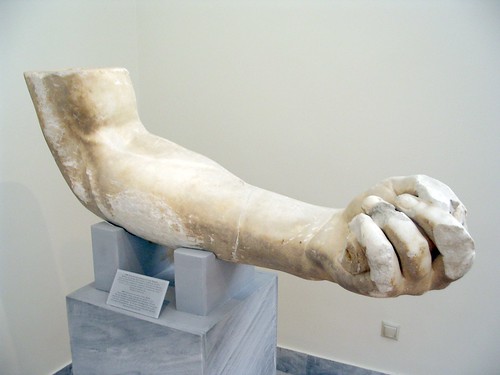 The Madness is over. No more basketball marathons. Louisville cut down the nets in a epic final against Michigan - well, an epic 30 minutes at least. So now it's time to get back to reality. Or go into hibernation until college football season. Or both.
The Madness is over. No more basketball marathons. Louisville cut down the nets in a epic final against Michigan - well, an epic 30 minutes at least. So now it's time to get back to reality. Or go into hibernation until college football season. Or both.
Oh, wait, the Stanley Cup playoffs are right around the corner, and it looks like the Toronto Maple Leafs might actually be a part of the festivities this year. The zombie apocalypse must be upon us. The Leafs haven't won the Stanley Cup since 1967, and their fans are becoming the hockey equivalent of Chicago Cubs fans.
So before I start the annual process of getting my hopes up for the Leafs, let's get moving on Episode 64 of the Rhubarb Report.
 Patient-centered care is an over-used, misunderstood, and oftentimes hypocritical phrase.
Patient-centered care is an over-used, misunderstood, and oftentimes hypocritical phrase.
There. I said it. I know, that is a pretty strong statement, but it had to be said.
It has become a trendy phrase that gets thrown around regularly these days. But the deeper meaning - and how to truly attain it - is, at times, lost or misunderstood.
There can be many subtle barriers to patient-centered care. We may think that something is patient-centered, yet it is far from it.
"Patient-centered" indicates more than just the fact that the patient is the center of the equation. It is more than just having a focus on the patient. True patient-centered care manifests itself in many ways.
 Consumers, patients, advocates, and physical therapists: it is time to have your voice heard.
Consumers, patients, advocates, and physical therapists: it is time to have your voice heard.
Texas HB 1039 - Patient Access To Physical Therapy - has received a public hearing with the House Public Health Committee. The hearing is scheduled for Wednesday, April 10 at 8:00 am in Room E2.012.
Under current state law, Texans are prohibited from receiving physical therapy treatment unless they have first obtained a referral from another provider. This is not a regulation driven by your insurance plan - it is state law. HB 1039 does not change a physical therapist's scope of practice whatsoever. What it does is provide a patient with the opportunity to be evaluated AND treated by a physical therapist for 45 days or 20 visits (whichever comes first) before a referral from another provider would be required to continue care.
Why is this bill important for Texans?
 The blank page. Such simplicity. Clean. Yet so daunting. Scary.
The blank page. Such simplicity. Clean. Yet so daunting. Scary.
Staring at a blank page, or screen, or canvas, can be one of the most daunting yet exhilarating moments we face. There can be a degree of trepidation and anxiety that forces you to put off the creative process. Maybe a better time or a better frame of mind will come. There are always any number of excuses to walk away from it. Hey, I don't need this right now. You can't make me do it.
Fear of the blank page. I have had my share of moments when I sat looking at this computer screen, thinking that there was simply nothing to say. I think we've all had those moments, not just in creating art, or writing, or pondering the origins of space and time. They come to us in the blank pages of our lives that we are creating moment by moment.
 Evidence and data are both an integral part of the scientific method - or so I thought. Here I was thinking that logic should provide a foundation for clinical reasoning and critical thinking. Crazy me.
Evidence and data are both an integral part of the scientific method - or so I thought. Here I was thinking that logic should provide a foundation for clinical reasoning and critical thinking. Crazy me.
If you are going through the effort and the expense (both in time and dollars) to collect data and accrue evidence, then wouldn't the next step be to utilize it?
Not if the evidence contradicts your current beliefs. Then you have a mess on your hands.
Evidence is ignored on a regular basis. And for a variety of reasons - none of which are positive in the long term.
 For a runner in today's world, there are countless issues making an appearance in discussions, magazines, and clinics. Many of them focus on running mechanics. Is there a best way to run? Is there not? Should you be a heel striker or mid-foot striker? Is there a benefit to running in a minimalist shoe? Should you run barefoot? The list of burning questions goes on and on and on.
For a runner in today's world, there are countless issues making an appearance in discussions, magazines, and clinics. Many of them focus on running mechanics. Is there a best way to run? Is there not? Should you be a heel striker or mid-foot striker? Is there a benefit to running in a minimalist shoe? Should you run barefoot? The list of burning questions goes on and on and on.
All of these questions focus on issues "below the waist". But the answers don't lie there as we might think. Improving your running mechanics may in fact have little to do with your lower body.
The solutions lie in - the arms? What makes the arms such an important tool in running mechanics?
 It is now time to take a deep breath. Whew. Week one of the NCAA men's basketball tournament is officially over. If 2 nights and 4 full days of basketball isn't exhausting, I am not sure just what is.
It is now time to take a deep breath. Whew. Week one of the NCAA men's basketball tournament is officially over. If 2 nights and 4 full days of basketball isn't exhausting, I am not sure just what is.
I think that there really should be a new ICD-9 code established for MMS - March Madness Syndrome. It is a seasonal affliction that presents with a number of hallmark signs and symptoms. Those affected by MMS have buttock discomfort associated with prolonged sitting, a subconscious ability to recite RPI rankings and scoring statistics, eyes dilated from prolonged viewing, and a sense of hangover-like symptoms the day after an extended viewing period without having consumed an ounce of alcohol.
Fortunately, the intervention for MMS is simple: more basketball - at least for a couple more weekends. There will be plenty of time after April 8 to recover.
The latest episode of the Rhubarb Report celebrates two of the reasons that make March such a great month - college basketball and the beginning of a new Formula One season. Enjoy!
 "Running Injuries: Etiology And Recovery- Based Treatment" (co-author Bridget Clark, PT) appears in the third edition and fourth editions of "Clinical Orthopaedic Rehabilitation: A Team Approach" by Charles Giangarra, MD and Robert C. Manske, PT.
"Running Injuries: Etiology And Recovery- Based Treatment" (co-author Bridget Clark, PT) appears in the third edition and fourth editions of "Clinical Orthopaedic Rehabilitation: A Team Approach" by Charles Giangarra, MD and Robert C. Manske, PT.
 Allan Besselink, PT, DPT, Ph.D., Dip.MDT has a unique voice in the world of sports, education, and health care. Read more about Allan here.
Allan Besselink, PT, DPT, Ph.D., Dip.MDT has a unique voice in the world of sports, education, and health care. Read more about Allan here.
 Top 5 finalist in three categories: "Best Overall Blog", "Best PT Blog" and "Best Advocacy Blog".
Top 5 finalist in three categories: "Best Overall Blog", "Best PT Blog" and "Best Advocacy Blog".